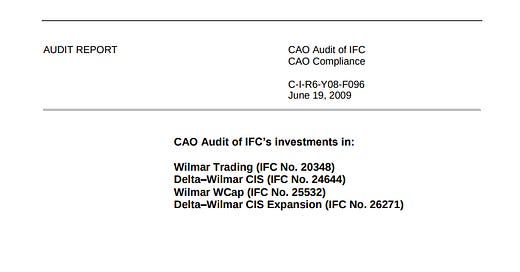Will the World Bank ever learn? IFC violates its own standards in palm oil sector in Indonesia
For the past five years, the Forest Peoples Programme and other NGOs have been working to persuade the World Bank’s private sector arm, the International Finance Corporation (IFC) that funding the oil palm sector in Indonesia is problematic. Given the destruction caused by oil palm plantations, you might think this would be easy. Not so. This is the World Bank, after all.
In July 2007, Forest Peoples Programme and 18 other NGOs filed a complaint with the IFC’s Compliance Advisory Ombudsman (CAO) about the IFC’s funding of the palm oil producing and trading company, Wilmar. The recently released CAO report found that “Because commercial pressures dominated IFC’s assessment process, the result was that environmental and social due diligence reviews did not occur as required.”
The IFC scandal comes as the World Bank is considering Indonesia’s Readiness Plan (or Readiness Preparation Proposal, as it is has been renamed) for the Forest Carbon Partnership Facility. Chad Dobson, the Executive Director of the Bank Information Center, notes, “As the FCPF considers whether or not to advance Indonesia’s proposal for readiness funds, the integrity of the program is threatened by political pressure to move the process as quickly as possible in anticipation of a potentially enormous market for forest carbon.” Dobson recommends putting the brakes on the Bank. “Approving Indonesia’s R-PP, identified as most problematic by a wide range of actors, will send a clear message to civil society that the FCPF is willing to sacrifice its own standards in the name of expediency.” Precisely what the CAO report found IFC did with its loans to Wilmar, in other words. Perhaps this time, the World Bank will learn from its mistakes. Perhaps.
World Bank violates its own standards in palm oil sector in Indonesia
Forest Peoples Programme
10th August 2009
PRESS INFORMATION FOR IMMEDIATE RELEASEThe World Bank’s private sector arm – the International Finance Corporation (IFC) – has allowed commercial interests to override its social and environmental standards in making major loans to the oil palm sector in Indonesia, an internal audit reveals.
Oil palm has become synonymous with widespread clearance of forests and peatlands, massive CO2 emissions and the theft of indigenous peoples’ lands.
Although the IFC knew about all these risks, due to its experience with prior projects and the warnings of non-government organisations, it went ahead with loans to the Wilmar palm oil trading group, in violation of its own standards, according to the report. The IFC failed to assess the supply chains or look into the damaging impacts of the company’s subsidiary plantations that were taking over community lands and forests in Borneo and Sumatra.
The findings have major implications for the IFC: not only must it apply its standards more carefully but it must check out concerns about where the companies it funds are sourcing their raw materials. Palm oil is only one example of commodities produced in violation of norms.
These findings come from a highly critical audit report just issued by the Compliance Advisory Ombudsman of the IFC which looked into a detailed complaint filed by the Forest Peoples Programme and a coalition of 19 Indonesian civil society and indigenous organisations, including SawitWatch and Gemawan.
Norman Jiwan of the Indonesian monitoring NGO, SawitWatch, notes:
“When we filed our complaint we noted that Wilmar subsidiaries were illegally using fire to clear primary forests and high conservation value areas and seizing indigenous peoples’ lands without their free, prior and informed consent, triggering serious conflicts. This report shows that the IFC overrode its standards and ignored our previous warnings.”
In response to the report Lely Khainur of the NGO Gemawan says:
“Development is meant to prioritise the needs and rights of local communities. The IFC’s standards require this. Yet they put business interests first and allow peoples’ lands to be stolen for the sake of cheap palm oil in the international market. Our peoples and our forests are being ruined to no good end, and ultimately the whole planet is suffering.”
Marcus Colchester the Director of the Forest Peoples Programme adds.
“We are satisfied that this report vindicates in great detail our main concerns. Also, the response of the IFC Management to the audit suggests they will now try to do things differently. Still, we remain somewhat exasperated. It has taken us more than five years to get the IFC to take these issues seriously. Given the urgency of halting forest loss and human rights abuses, we call on the IFC President to take personal proactive steps to ensure this never happens again.”
More information:
The original complaint and follow up correspondence with the IFC and CAO is available here (pdf file, 168 KB) and here.The CAO audit report is available here (pdf file, 4.5 MB).






Comments following the original post on REDD-Monitor.org are archived here: https://archive.ph/5k2y4#selection-903.4-903.14